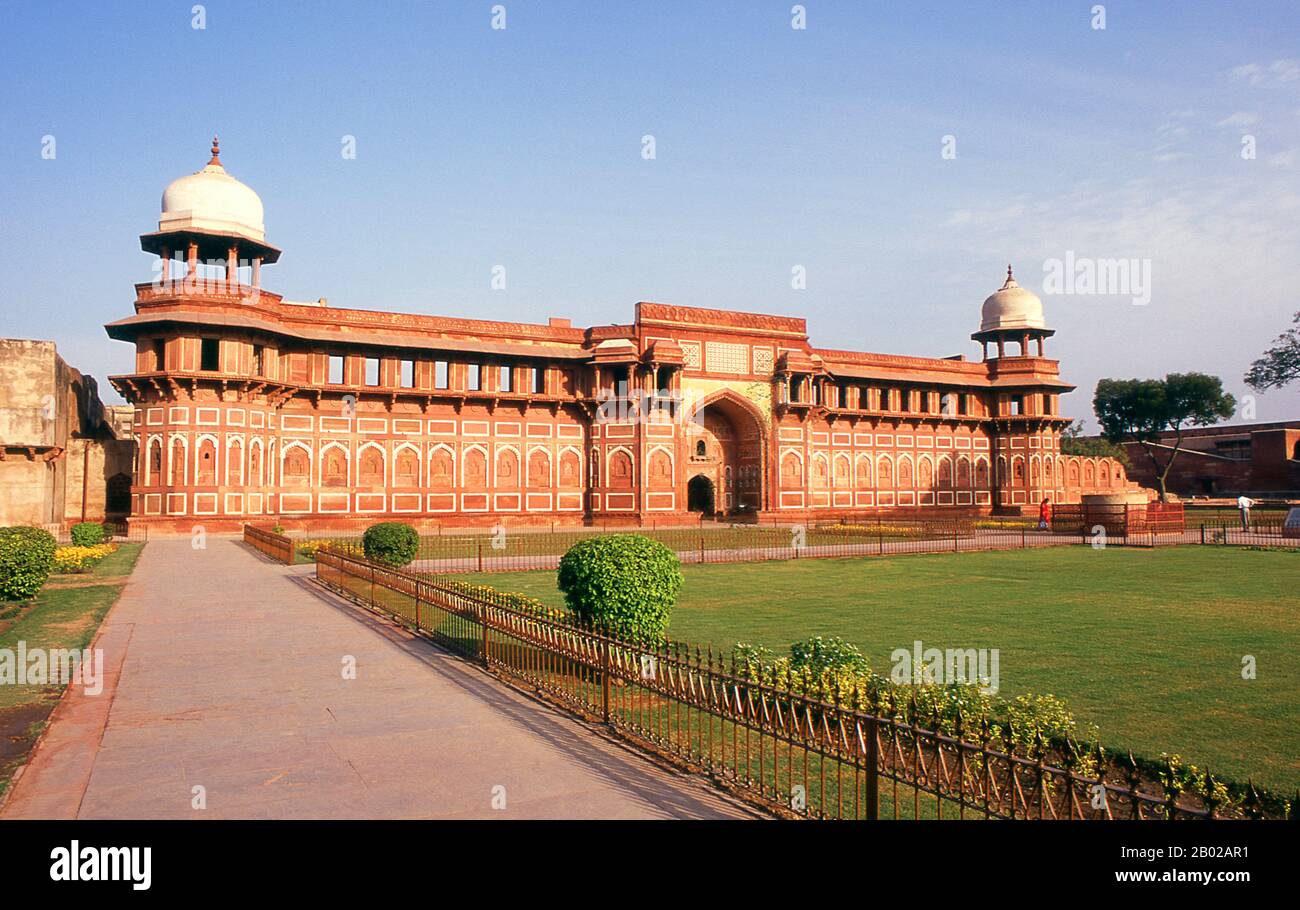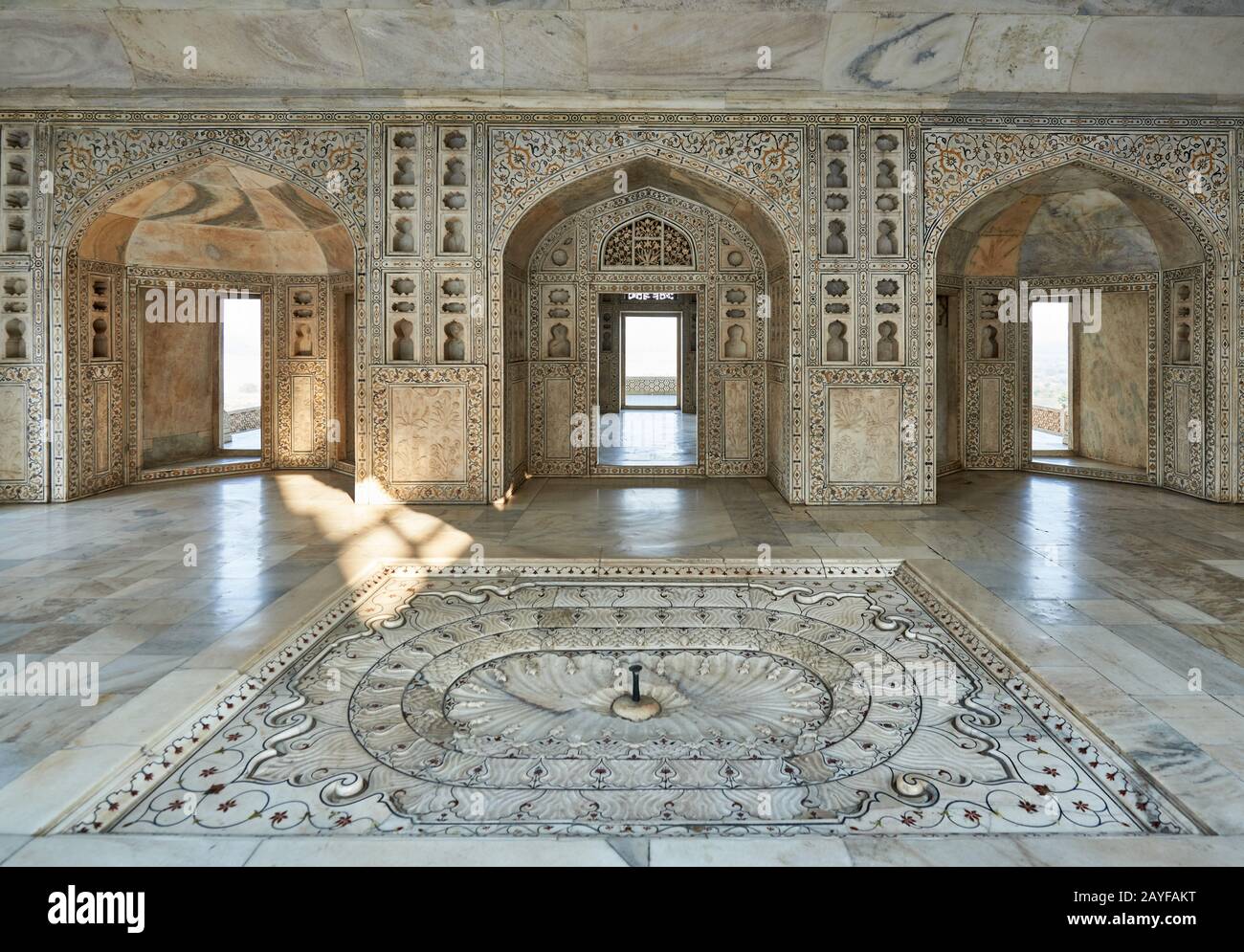Explore Agra Fort: A Mughal Masterpiece in India

History of Agra Fort India
History and construction of Agra Fort
Let's take a stroll down memory lane and explore the fascinating history behind the majestic Agra Fort. Imagine yourself transported back to the 16th century when Emperor Akbar built this grand fortress. As you walk through its towering walls and intricate maze of buildings, you can feel the whispers of history echoing around you.
The construction of Agra Fort began in 1565 and took about eight years to complete. It was originally built as a military structure but later evolved into a magnificent palace complex under the reign of Shah Jahan. The fort is made of red sandstone and stretches over an area of about 94 acres, surrounded by a moat on three sides.
Significance of Agra Fort in Indian history
Now, let me share with you why this iconic fort holds such great importance in Indian history. Picture this – it served as the main residence for many Mughal emperors, including Shah Jahan who transformed it into a symbol of power and opulence with the addition of stunning marble palaces like the famous Moti Masjid.
Agra Fort witnessed several pivotal moments in Indian history, from being a strategic military base to witnessing royal intrigues within its walls. Its architectural beauty, combined with its historical significance, makes it a UNESCO World Heritage Site today.
As you delve deeper into the past glory of Agra Fort, each corner reveals tales of love, power, and resilience that have shaped India's narrative over centuries. So, the next time you visit this incredible monument, remember that you are walking in the footsteps of emperors and explorers who left an indelible mark on our shared heritage.
Architecture of Agra Fort India
Mughal architectural style of Agra Fort
As you stand within the grand walls of Agra Fort, take a moment to appreciate the exquisite Mughal architectural style that adorns every corner. Visualize the intricate carvings, delicate marble screens, and beautiful domes that showcase the craftsmanship of artisans from centuries past. The fusion of Persian, Islamic, and Indian styles creates a visual symphony that leaves visitors in awe.
Notable structures within Agra Fort
Exploring further into this historical marvel, you'll encounter several notable structures that stand as testaments to the opulence of the Mughal era. Imagine walking through the Diwan-i-Am (Hall of Public Audience), where once emperors held court and addressed their subjects. Marvel at the Sheesh Mahal (Palace of Mirrors) with its intricate mirror work reflecting light in a dazzling display.
Continue your journey through history by discovering hidden gems like the Jahangir Palace and Khas Mahal, each offering a glimpse into the lavish lifestyle of royalty. Every step you take within Agra Fort unveils stories of grandeur and artistry that have stood the test of time.

Agra Fort India: UNESCO World Heritage Site
Inclusion of Agra Fort in UNESCO World Heritage List
Wander through the illustrious Agra Fort and marvel at its historical significance as a UNESCO World Heritage Site. Picture yourself strolling through the rich tapestry of Mughal architecture, each detail whispering tales of a bygone era. The recognition from UNESCO celebrates the fort's cultural value and ensures its preservation for generations to come.
Preservation efforts and challenges
As you traverse the corridors of Agra Fort, ponder upon the tireless efforts undertaken to preserve this architectural gem. Envision conservationists meticulously restore faded frescoes and crumbling walls to maintain the fort’s splendour. Challenges such as pollution, urban encroachment, and natural wear pose constant hurdles, yet dedicated initiatives strive to safeguard this heritage site.

Diwan-i-Am and Diwan-i-Khas at Agra Fort
Purpose and design of Diwan-i-Am
Step into the grandeur of Diwan-i-Am at Agra Fort and imagine yourself in the midst of historical gatherings. Visualize the opulence around you as this hall, designed by Emperor Shah Jahan, served as a platform for public audiences. The intricate carvings on the columns and arches evoke a sense of regality, reflecting the Mughal architectural finesse. The purpose of Diwan-i-Am was to provide a space where the emperor could address the common people, fostering a sense of unity and governance.
Importance of Diwan-i-Khas in Mughal administration
Venture into the chambers of Diwan-i-Khas within Agra Fort and immerse yourself in its significance in Mughal governance. Imagine sitting amidst elegance as this hall, which was reserved for private audiences, facilitated confidential discussions between the emperor and select courtiers. The adorned pillars and marble work symbolize exclusivity, underlining the authority wielded within these walls. Created to conduct important state affairs away from the public eye, Diwan-i-Khas played a pivotal role in shaping decisions that influenced the empire's trajectory.

Jahangir Palace and Khas Mahal in Agra Fort
History and architectural features of Jahangir Palace
Explore the enchanting Jahangir Palace within Agra Fort to delve into its rich history and architectural marvels. Step back in time and immerse yourself in the intricate carvings adorning the walls, showcasing a blend of Persian and Indian artistic influences. Built during the reign of Emperor Akbar, this palace exudes elegance with its ornate balconies offering panoramic views. As you wander through the halls, envision royal meetings and ceremonies that once filled these chambers, painting a vivid picture of Mughal grandeur.
Splendour of Khas Mahal within Agra Fort
Step into the luxurious ambience of Khas Mahal at Agra Fort, where royalty meets refinement. Picture yourself surrounded by serene gardens and elegant architecture as you stand in this private residence built for Shah Jahan's daughters. The white marble facade glistens under sunlight, reflecting a sense of tranquillity and opulence. Each room whispers stories of bygone eras, echoing tales of love and royal decadence that defined the Mughal lifestyle. Allow yourself to be transported to a time when every corner held secrets of power and beauty.

Moti Masjid and Nagina Masjid in Agra Fort
Significance of Moti Masjid as a prayer hall
As you step into the serene Moti Masjid within Agra Fort, you are greeted by peace and spirituality. This white marble mosque served as a private place of worship for the Mughal emperors, offering a tranquil sanctuary for prayer and reflection. The intricate craftsmanship of its architecture reflects the devotion and meticulous attention to detail that went into creating this sacred space. Feel a sense of serenity wash over you as you imagine the echoes of prayers that once filled these hallowed halls, connecting you to centuries-old traditions.
Architecture and design of Nagina Masjid
Discover the hidden gem of Nagina Masjid nestled within Agra Fort, showcasing exquisite Islamic architecture at its finest. This charming mosque captivates with its elegant domes, delicate minarets, and ornate carvings that speak volumes about the craftsmanship of artisans from the Mughal era. Imagine yourself marvelling at the symmetrical patterns and geometric designs that adorn every surface, creating a mesmerizing sight that transports you to a bygone era of artistic brilliance. Take a moment to appreciate the beauty and intricacy of Nagina Masjid's design, encapsulating the essence of spiritual devotion and architectural splendour.

Sheesh Mahal and Anguri Bagh at Agra Fort
Magnificence of Sheesh Mahal's mirror work
Step into the dazzling Sheesh Mahal at Agra Fort and be mesmerized by the intricate mirror work that adorns its walls, ceilings, and pillars. The reflective surfaces create a magical ambience as light dances off the countless mirrors, creating a spectacle of shimmering beauty that will leave you in awe. Explore the craftsmanship and artistry behind each meticulously placed shard of glass, reflecting not just light but also the grandeur of Mughal architecture and design. Lose yourself in the shimmering wonderland of Sheesh Mahal, where every corner tells a story of opulence and creativity.
The beauty of Anguri Bagh garden at Agra Fort
Stroll through the charming Anguri Bagh garden within Agra Fort, a tranquil oasis amidst historical grandeur. The lush greenery, fragrant flowers, and symmetrical layout of this Mughal-style garden provide a serene retreat from the bustling fort surroundings. Picture yourself relaxing under shaded alcoves or wandering along pathways lined with grapevines, cherishing moments of peace and tranquillity in this picturesque setting. Immerse yourself in the beauty of nature as you admire the meticulous planning and design that went into creating this verdant paradise within Agra Fort.

Agra Fort Light and Sound Show
Information about the light and sound show at Agra Fort
Are you ready to be enchanted by the captivating Agra Fort Light and Sound Show? As dusk settles over this iconic monument, immerse yourself in a magical experience that brings history to life through a symphony of light, sound, and narration. The show highlights the rich heritage of Agra Fort, narrating tales of glory and valour that echo through the centuries. Witness the fort's majestic structures bathed in colourful lights as the storytelling transports you back in time to relive its storied past.
Experience and schedule of the show
Step into an evening of wonder as you attend the Agra Fort Light and Sound Show. Delight in a sensory journey that combines history with entertainment, offering insights into Mughal history and architecture in a truly engaging way. The show typically runs for 1-1.5 hours, with multiple language options available for narration to cater to diverse audiences. Check the schedule beforehand to ensure you don't miss this illuminating experience during your visit to Agra.
